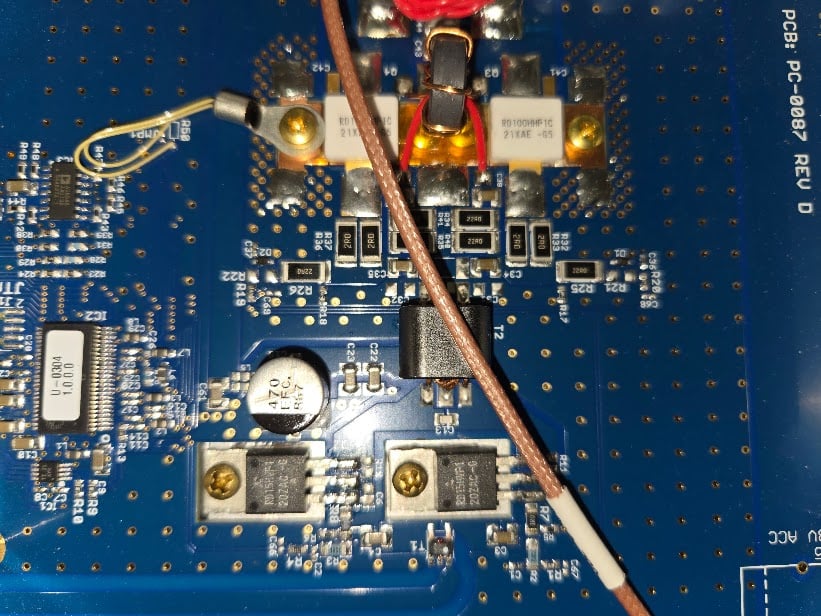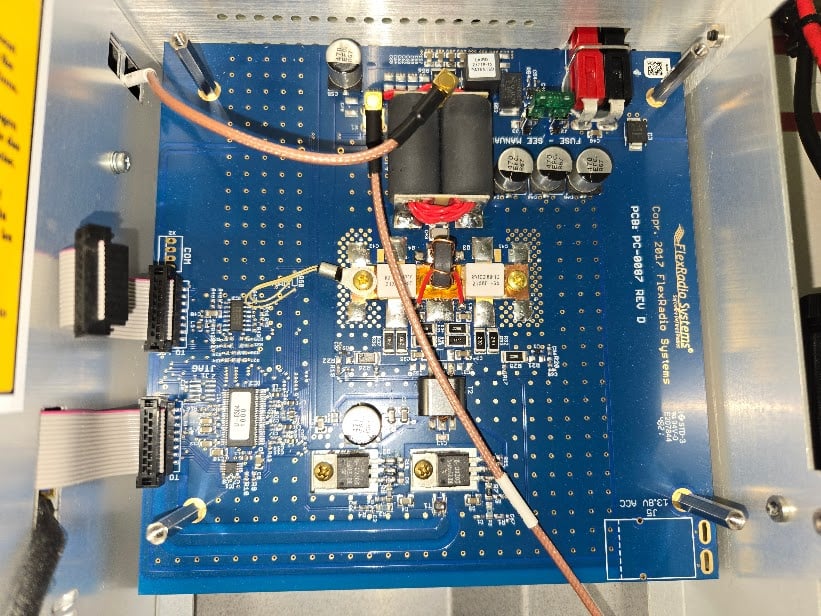SmartSDR v4.1.5 | SmartSDR v4.1.5 Release Notes
SmartSDR v3.10.15 | SmartSDR v3.10.15 Release Notes
The latest 4O3A Genius Product Software and Firmware
Need technical support from FlexRadio? It's as simple as Creating a HelpDesk ticket.
6400 Lower Output and Higher PA Temp on 10 & 12m

Using a MyAntenna's 80-10m antenna w/the integrated tuner on - SWR 1.2.
Running FT8 10m at RF Power of 60 and 70 watts really heats up the PA, if more than a few minutes, temperature is greater than 160 F. The fans kick on and spin faster to compensate.
The same on 12m isn't as bad. 10m sees the highest voltage drop and highest temperature.
6m on a resonant dipole is not affected. 10m is the worst …
What would cause this?
Comments
-
Update:
On the primary antenna, no tuner, SWR is 1.2. The PA gets hot quick on 10m, it does not rise rapidly on any other band, just 10.For example, on FT8, 10m with the SWR at 1.2, it went from 88F to 112F with one FT8 cycle of 15 seconds. With cycles 2 & 3 it got up to 128F. SWR REF is 0.5W. The fan kicked in by then. This measured in FRStack.
0 -
Also tested on antenna port 2, with a resonant 10m antenna. Without the ATU engaged, SWR is 1.5W with reflected power of 1.5W. RF power set to 70w. FWD power 55w. With several FT8 cycles of 15 minutes, the PA temp climbed to 130F.
0 -
Try it on a dummy load if you have one. And, if it continues to show the same behavior, I would suggest opening a Help Desk ticket so that tech support can help you figure out what is going on.
James
WD5GWY
0 -
From Chat GPT for what it's worth:
The FlexRadio 6400 (and 6400M) uses the same RF deck design as the 6600, with a single 100 W power amplifier module.
The power amplifier transistors (modern LDMOS devices, e.g., NXP/Freescale MRFE6VP61K25H or similar) are designed to safely operate up to ~150 °C junction temperature. However, FlexRadio manages them well below that limit.
Typical ranges you’ll see in normal operation:
- Idle / receive: ~30–40 °C (depends on ambient temp and airflow)
- Transmit, light duty (SSB, CW): ~50–65 °C
- Transmit, heavy duty (RTTY, FT8, digital, high duty cycle): ~65–75 °C
- Maximum safe operating range (before protective shutdown): ~85–90 °C reported at the device flange
FlexRadio firmware will automatically reduce output or shut down the PA if temperatures approach unsafe limits. In practice, most operators report PA temps in the 55–70 °C range during normal use, even with digital modes at 100 W continuous.
👉 If you’re seeing >80 °C often, it’s worth checking:
- Dust buildup on the heat sink or fans
- Adequate airflow around the radio (not enclosed tightly)
- Fan operation (the internal fan ramps with temperature)
0 -
As suggested, the first thing is try to recreate this with a dummy load.
0 -
I am trying to find a dummy load locally; otherwise I will go to eBay or elsewhere to source it. While I am sourcing the D.U., given a good match on two antennas with no ATU, less than 1.3, what would cause the heat to rise on 10m more than other bands?
0 -
DX Engineering has 100 w dummy loads for under $40. I looked on eBay and they looked more expensive.
Your question is a good one. The reason a dummy load is always suggested is because if you send the radio in and we can't recreate the problem then you'll get charged for the bench time.
0 -
Mike-VA3MW and others - I now have a dummy load, a Bird 8201 capable of 500w. 4ft LMR 400 (ABR brand) coax from ANT1 to Dummy Load. Good coax - sweeps from DC to 300 MHz with flat SWR (Comet CAA-500 MKII).
Tests ran w/Astron 35M with a 4 foot 12 gauge wire. ATU and MEM off for all bands.
Tune set to 100W. All bands set to CW for Tune. FRStack used for all measurements.
I noticed on the band scope, 10m is very 'noisy' during TX as compared to all other bands. I can also hear the radio hum during transmit, louder on 10m than other bands. Just enough to be perceived as different.
The same 'noise' appears with 5 watts tune power, only less pronounced (compared to 100w). The hum also dissipates as power is reduced on 10.
After allowing the PA to cool down to 89, with tune enabled for 15 seconds, PA rose to 125 on 10m.
After allowing the PA to cool down to 89, with tune enabled for 15 seconds, PA rose to 104 on 20m.On 10m, the PA temperature rises much quicker than all other bands. The same visual noise pattern on 10m with ANT 1 & ANT 2.
When I had it open to reseat the fuse, it was very clean inside, zero accumulated dust to be found anywhere.
I also just reset the radio (white LED) and it had no affect on the wave form output, louder-hum, or PA temp climb on 10m.
Band
160
80
60
40
30
20
17
15
12
10
6
RX V
13.8
13.8
13.8
13.8
13.8
13.8
13.8
13.8
13.8
13.8
13.8
TX V
12.4
13
13
12.8
12.8
12.9
13.1
12.8
12.8
12.4
12.8
Mode
CW
-
-
-
-
-
-
-
-
-
-
TUNE Out
100
-
-
-
-
-
-
-
-
-
-
FWD Out
90
95
90
91
92
89
94
100
64
70
81
REF In
0.01
0.01
0.01
0.01
0.02
0.02
0.04
0.05
0.05
0.05
1.3
SWR
1.1
1.1
1.1
1.1
1.1
1.1
1.1
1.1
1.2
1.2
1.3
0 -
Is there anything I can check inside, loose connection, or otherwise that would contribute to this problem?
Maybe verify connections on the boards above the main power board where fuse is connected?
Cable, connector, anything? Would disconnecting the ATU be worthwhile, to take it out of the TX/RX circuit?
With the load testing done, I am back to FT8 on all bands. Running the normal 15 second cycles, and RF power set to 70w, the radio stays below 125F except for 10m where it rises quickly.
What could affect 12 & 10m while the other bands remain unaffected? I presume this is not normal.
Can someone do the same into a D.U. and report their temps on 10m?0 -
It may have to come home for recalibration. Beyond that, we are just guessing. The service guys have access to many more measurement tools.
If you have not already, please open a support ticket.
0 -
I moved again from the Astron (linear) to Alinco (switching). I noticed that the amperage draw on 10 is much higher than other bands. For example @ 70W RF sending FT8 signal, the Alinco AMP meter displays
20M: ~18A on TX
12M: ~20A on TX
10M: ~28A on TX - lowest FWD wattage out & highest PA temp rise
6M: ~18A on TXThe two bands with the least power out have a heavier Amperage draw than the bands that are operating normally.
I removed the top of the 6400 while operating and found the power supply to be source of the hum. They are in close proximity.
This also explains the more distinct hum coming from the power supply as it is putting out ~28A on 10m as compared to ~18A on 20m (+10 difference). The PS is working harder on 10m …
Would the higher Amperage heat up the PA faster? This is the band with the fastest PA temp rise.
Can you help with the support ticket process? Will I be able to talk w/someone about the problem and troubleshooting or is it email support only?0 -
I pulled the ATU and re-checked the fuse. It was in solid. When I pulled the middle board to get to the fuse, pulling RXA and LPF X2 connections to pull out the board, I noticed the LPF X2 cable was running right over the finals (?).
There is no way to re-route this cable other than diagonal across the board to the LPF X2 connection on the right. So running over top of the finals like the photo below is the only routing option.
As another troubleshooting step, I replaced the fuse with another 30A fuse. Put it back together, and the problem persists. Heavier amperage draw on 10m. No change.
I see no visible damage to the boards ATU or middle board. Very clean.Would the routing of the PA cable radiate into the finals or other components if like the configuration below?
The former owner said he had to send it back to Flex for repairs. If I provide the serial, can someone tell me what the repairs were? There's an old SD card in the box.
Back to the dummy load and playing with tune power. 10m, with tune power of 35w, draws 20A. 20m, 40, and 80m, with the same tune power of 35w, draws 12A.
I also updated to 3.10.10 this afternoon and cold booted before powering-up.
0 -
I think your best bet is to open a Help Desk ticket and start the process of getting your radio to Flex Radio for service. If you really like the radio, it will be worth the investment to get it serviced by a tech at Flex Radio who is well equipped to diagnose and repair anything that can go wrong with a Flex radio. I have used Flex Radio service in the past and I have never been disappointed with the quality of the service provided.
James
WD5GWY
0 -
I talked to Service about this and the radio has to come home for realignment. Sorry.
2
Leave a Comment
Categories
- All Categories
- 385 Community Topics
- 2.2K New Ideas
- 650 The Flea Market
- 8.4K Software
- 151 SmartSDR+
- 6.5K SmartSDR for Windows
- 189 SmartSDR for Maestro and M models
- 437 SmartSDR for Mac
- 274 SmartSDR for iOS
- 263 SmartSDR CAT
- 202 DAX
- 383 SmartSDR API
- 9.4K Radios and Accessories
- 48 Aurora
- 289 FLEX-8000 Signature Series
- 7.2K FLEX-6000 Signature Series
- 962 Maestro
- 58 FlexControl
- 866 FLEX Series (Legacy) Radios
- 936 Genius Products
- 467 Power Genius XL Amplifier
- 343 Tuner Genius XL
- 126 Antenna Genius
- 306 Shack Infrastructure
- 215 Networking
- 465 Remote Operation (SmartLink)
- 144 Contesting
- 804 Peripherals & Station Integration
- 142 Amateur Radio Interests
- 1K Third-Party Software





